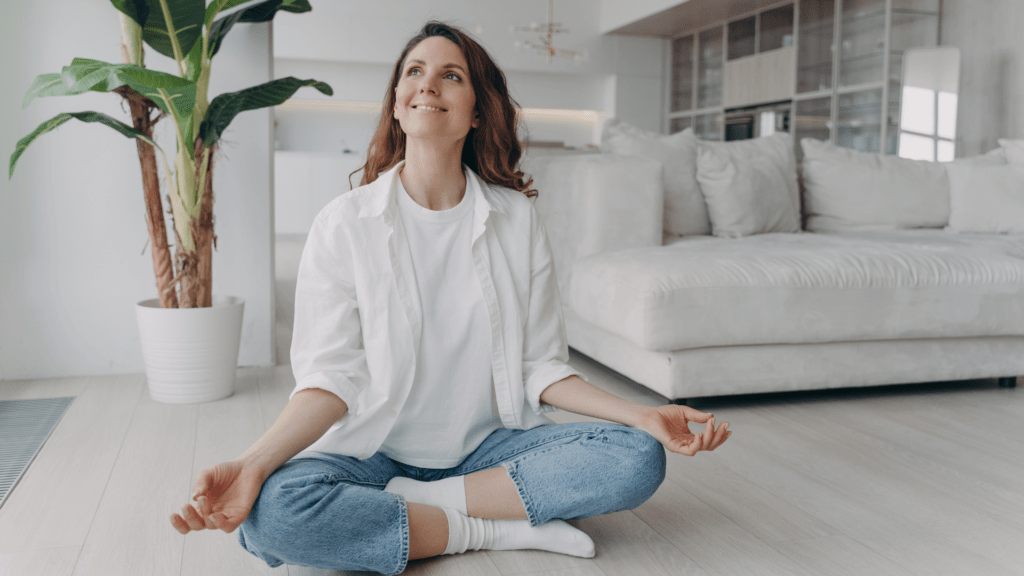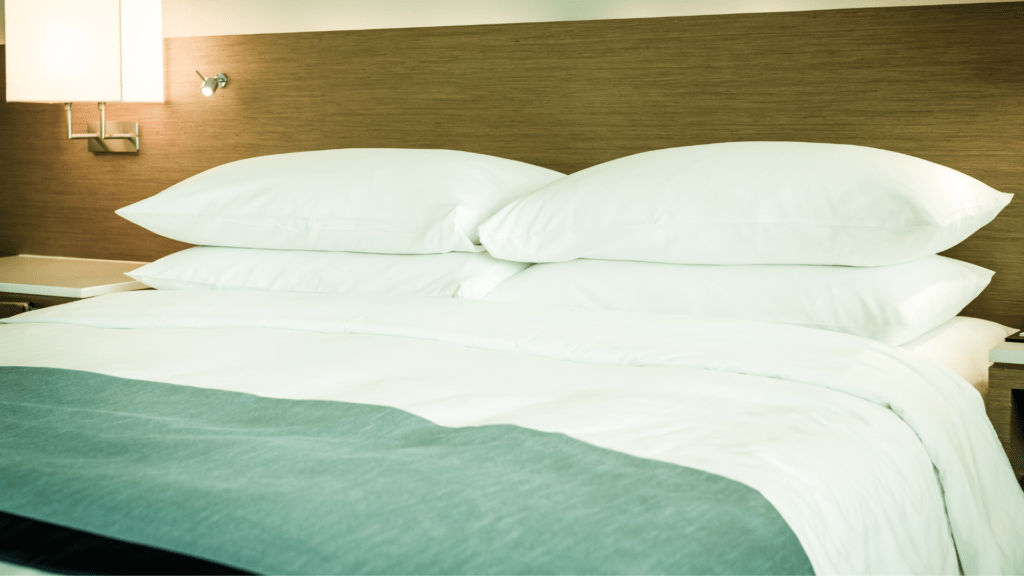Most people think that getting eight hours of sleep is all it takes to feel rested and rejuvenated. But here’s the thing: it’s not just about quantity—it’s about quality. “Core sleep,” is a concept that focuses on the most crucial hours of your sleep cycle. Understanding and optimizing core sleep can make a world of difference in how refreshed you feel each morning. By prioritizing “core sleep,” you can effectively improve sleep quality and wake up feeling more energized and ready to tackle the day ahead.

Importance of Good Sleep
Getting good sleep is more than just about feeling awake. It’s about boosting your overall health and well-being. Think of sleep as the foundation of your daily life. When you sleep well, your body repairs itself, your mind processes information, and you wake up ready to tackle the day. For those struggling to fall asleep fast, implementing effective sleep strategies can make all the difference.
But let’s be real. Many of us struggle with sleep. Stress, poor habits, and even our environment can mess with our sleep quality. That’s why understanding the elements that contribute to good sleep is crucial.
Overview of Core Sleep
So, what exactly is core sleep? Core sleep refers to the most restorative part of your sleep cycle. It’s typically the first four to six hours of sleep, where you cycle through the deepest stages of non-REM and REM sleep. These stages are critical for physical repair, memory consolidation, and emotional regulation.

Unlike total sleep time, which counts the hours you’re in bed, core sleep zeroes in on those key hours that make a difference. By improving core sleep, you can enhance your sleep quality without increasing your total sleep time.
Understanding Core Sleep
Core sleep is the secret ingredient to waking up feeling genuinely rested. It’s not just about lying in bed for eight hours—it’s about getting the right kind of sleep. Core sleep usually happens in the first few hours after you fall asleep and includes the most restorative stages of your sleep cycle.
During core sleep, your body goes through deep non-REM sleep and REM sleep. Deep non-REM sleep is when your body repairs tissues, builds bone and muscle, and strengthens the immune system. REM sleep, on the other hand, is when your brain processes information and consolidates memories.
How Much Core Sleep Do You Need?
You might be wondering, “How much core sleep do I need?” The answer varies from person to person, but generally, aiming for about four to six hours of core sleep can make a significant difference.
To figure out if you’re getting enough core sleep, pay attention to how you feel during the day. Are you constantly tired or do you struggle to focus? These could be signs you’re not getting enough core sleep. Other signs include frequently waking up during the night, feeling unrefreshed in the morning, and relying on caffeine to get through the day.
To maximize your core sleep, try to go to bed and wake up at the same time every day, create a calming bedtime routine, and make your sleep environment as comfortable as possible.
Benefits of Core Sleep
Many people believe that simply sleeping longer guarantees better rest. However, the truth is that the quality of sleep, especially focusing on core sleep, is what truly impacts how refreshed you feel. Core sleep, which includes the most restorative stages of sleep, is crucial for overall well-being.
Physical Health Benefits
Getting enough core sleep has a significant impact on your physical health. During core sleep, your body undergoes vital repair processes. This deep sleep stage is when your body heals tissues, builds muscle, and strengthens the immune system. By ensuring you get sufficient core sleep, you’re setting the stage for better physical health.
For instance, studies have shown that people who consistently get good core sleep have a lower risk of chronic illnesses like heart disease and diabetes. This is because your body’s ability to repair and regenerate is optimized during these crucial sleep stages.
Mental Health Benefits
Core sleep isn’t just about physical repair. It plays a vital role in maintaining your mental health too. When you get adequate core sleep, your brain processes and consolidates information from the day, which is essential for learning and memory.
Moreover, core sleep helps regulate your emotions. Lack of core sleep can lead to mood swings, increased stress, and even anxiety or depression. By prioritizing core sleep, you’re not just taking care of your body, but also nurturing your mind.

Techniques to Improve Core Sleep
Now that we know how important core sleep is, let’s explore some practical techniques to improve it. Focusing on these strategies can help you get the restorative sleep you need without necessarily increasing your total sleep time.
Establishing a Sleep Routine
One of the best ways to improve core sleep is by establishing a consistent sleep routine. Going to bed and waking up at the same time every day helps regulate your body’s internal clock. This consistency makes it easier for you to fall asleep and wake up naturally, leading to better core sleep.
Start by setting a regular bedtime that allows you to get at least 7-8 hours of sleep. Stick to this schedule, even on weekends. Creating a bedtime routine can also signal to your body that it’s time to wind down. This could include activities like reading a book, taking a warm bath, or doing some gentle stretches.
Optimizing Your Sleep Environment
Your sleep environment plays a crucial role in the quality of your core sleep. Make sure your bedroom is conducive to sleep by keeping it cool, dark, and quiet. Use blackout curtains to block out any light and consider using a white noise machine or earplugs if you’re sensitive to noise.
Limiting Screen Time Before Bed
We’ve all heard that screens can mess with our sleep, but did you know that the blue light emitted by phones, tablets, and computers can disrupt your core sleep? Blue light interferes with the production of melatonin, the hormone that regulates sleep.
To improve your core sleep, try to limit screen time at least an hour before bed. Instead of scrolling through your phone or watching TV, consider activities that help you relax, such as reading a physical book, meditating, or listening to calming music.
Meditation for Better Sleep
A lot of people believe that meditation is only for relaxation or stress relief during the day. But here’s a fun fact: meditation can significantly improve your sleep quality too. Incorporating a deep sleep-guided meditation into your nightly routine can help you fall asleep faster and enjoy more restorative sleep. Whether you choose a calming sleep meditation or a deep sleep meditation, such as those offered by Jason Stephenson, you’ll find that these practices can transform your bedtime experience.

For example, Jason Stephenson’s deep sleep meditation or guided sleep meditations are specifically designed to help you unwind and drift off peacefully. His deep sleep-guided meditations, including the popular Jason Stephenson sleep, talk down, are crafted to guide you into a state of profound relaxation and restfulness.
If you’re looking for effective ways to fall asleep fast, incorporating Jason Stephenson’s guided meditation for sleep or his meditation for a deep sleep can be a game-changer. Jason Stephenson’s sleep meditations are specifically designed to calm your mind and improve the quality of your rest.
By integrating Jason Stephenson’s meditation practices into your nightly routine, you’ll find it easier to achieve a deep, restorative slumber. His sleep-focused content helps enhance relaxation, making it simpler to transition into a peaceful and rejuvenating sleep.
Benefits of Meditation for Sleep
Meditation is a powerful tool for improving sleep because it helps you relax, reduces stress, and quiets the mind. When your mind is calm and free from the day’s worries, it’s much easier to drift into a peaceful slumber. Studies have shown that practicing meditation to sleep can decrease insomnia and improve overall sleep quality. By incorporating meditation for sleep into your routine, you create a serene mental state that supports deeper and more restorative sleep.
For example, guided meditation for sleep, such as those by Jason Stephenson, can be particularly effective. His deep sleep meditation sessions use soothing voices and calming music to guide you into a state of relaxation, making it easier to fall asleep and stay asleep. Meditation for deep sleep, relaxation sleep meditation, and sleep meditation videos can all be found online, providing accessible resources to help you improve your sleep habits.
Simple Meditation Techniques
You don’t need to be a meditation expert to reap the benefits of relaxing sleep meditation. Here are some simple techniques you can try:
Guided Meditation
Follow along with a sleep meditation talk by Jason Stephenson or other experts. These sessions are designed to guide you into a state of relaxation and are perfect for beginners.
Breathing Exercises
Focus on your breath by inhaling deeply through your nose and exhaling slowly through your mouth. This simple practice can help calm your mind and prepare your body for sleep.
Mindfulness Practices
Practice being present in the moment without judgment. Mindfulness meditation can help you let go of the day’s stresses and ease into sleep.
By incorporating these meditation techniques into your nightly routine, you can create a powerful habit that promotes better sleep.
Vitamins and Supplements To Improve Sleep Quality
Many people think that vitamins are only for boosting your immune system or improving your overall health. However, certain vitamins and minerals can also play a crucial role in enhancing your sleep quality. Taking the right supplements before bed can help you fall asleep faster and enjoy a deeper, more restful sleep.
Overview of Sleep-Boosting Vitamins
Vitamins are essential for overall health, but some have specific benefits for sleep. For instance, vitamins for better sleep, such as Vitamin D, magnesium, and melatonin, can help regulate your sleep-wake cycle and improve sleep quality. Incorporating vitamins to help sleep into your daily regimen can make a significant difference in how well you rest, ensuring you wake up feeling more refreshed and energized.
Key Vitamins for Better Sleep
Essential vitamins for sleep like Vitamin D and magnesium promote restful sleep, helping you wake up refreshed each day. Incorporating these vitamins into your routine can significantly improve your sleep quality and overall well-being. Taking a vitamin to sleep can address deficiencies that may be disrupting your rest. Many people find that vitamins for better sleep, such as magnesium and B6, help them fall asleep faster and stay asleep longer. Additionally, using vitamins for good sleep supports a more restful and rejuvenating sleep cycle, allowing you to wake up feeling refreshed and energized.

Vitamins that help sleep include magnesium and Vitamin B6, which can significantly enhance your sleep quality. These Vitamins that help with sleep, such as melatonin, play a crucial role in regulating the sleep-wake cycle. They help you sleep, like Vitamin D, are essential for overall health, and can prevent disruptions in your rest. They make you sleepy, such as magnesium, help calm the nervous system, and prepare your body for sleep. Lastly, vitamins that promote sleep ensure you achieve deeper, more restorative sleep, contributing to better overall health.
Vitamin D
Vitamin D is known for its role in bone health, Vitamin D also supports sleep regulation. Low levels of Vitamin D are linked to sleep disorders and poor sleep quality. You can get Vitamin D from sunlight, food, and supplements.
Magnesium
This mineral is essential for relaxation and can help reduce insomnia. Magnesium supplements can improve sleep quality by calming the nervous system and relaxing muscles. Foods rich in magnesium include leafy greens, nuts, and seeds.
Melatonin
A hormone that regulates the sleep-wake cycle, melatonin is often taken as a supplement to increase deep sleep to tackle sleep problems. It’s especially useful for people with irregular sleep schedules or jet lag. Melatonin supplements should be used with caution and ideally under the guidance of a healthcare professional.
Best Practices for Taking Sleep Vitamins
To get the most benefit from these vitamins and supplements, consider the following tips:
Timing
Take your vitamins at night or before bed to maximize their sleep-inducing effects. For example, nighttime vitamins and supplements to take at night can help you wind down and prepare for sleep.
Dosage
Follow the recommended dosage on the supplement label or consult with a healthcare provider to avoid any potential side effects.
Combination
Some sleep supplements combine multiple vitamins and minerals to enhance their effectiveness. Look for supplements that include a blend of sleep-promoting ingredients.
By incorporating these vitamins and supplements into your nightly routine, you can support your body’s natural sleep processes and enjoy better sleep quality.
Diet and Lifestyle Changes for Improved Sleep
A common misconception is that only sleep aids and supplements can help improve your sleep quality. In reality, simple diet and lifestyle changes can have a profound impact on how well you sleep. What you eat and how you live your day-to-day life play crucial roles in ensuring you get the best core sleep possible.
Foods That Promote and Improve Sleep Quality
Certain foods can help you fall asleep faster and enjoy deeper sleep. Here’s a list of the best foods to eat before bed:
Almonds and Walnuts
These nuts are great sources of melatonin and magnesium, which help you fall asleep and stay asleep.
Chamomile Tea
Known for its calming effects, chamomile tea can help reduce anxiety and promote better sleep.
Kiwi
This fruit is packed with vitamins C and E, serotonin, and folate, which can help improve sleep quality.
Fatty Fish
Rich in omega-3 fatty acids and vitamin D, fatty fish like salmon and tuna can help regulate your sleep-wake cycle.
Tart Cherry Juice
This juice is a natural source of melatonin and has been shown to improve sleep duration and quality.
On the flip side, there are foods you should avoid if you want to get better sleep:
Caffeine
Found in coffee, tea, chocolate, and many sodas, caffeine is a stimulant that can keep you awake.
Spicy Foods
These can cause indigestion and disrupt your sleep.
Alcohol
While it might make you sleepy initially, alcohol can interfere with your sleep cycle and reduce the quality of your rest.
Lifestyle Habits for Better Sleep
Adopting healthy lifestyle habits can make a big difference in your sleep quality. Here are some tips to help you get started:
Exercise Regularly
Engaging in physical activity during the day can help you fall asleep faster and enjoy deeper sleep. Aim for at least 30 minutes of moderate exercise most days of the week. Just be sure to avoid vigorous exercise close to bedtime.
Manage Stress to Improve Sleep Quality
High-stress levels can interfere with your ability to fall asleep and stay asleep. Incorporate stress-reducing activities into your daily routine, such as yoga, meditation, or spending time in nature.
Limit Naps
While short naps can be refreshing, long or irregular napping during the day can negatively affect your nighttime sleep. If you must nap, try to keep it to 20-30 minutes and do it early in the afternoon.
Create a Bedtime Routine
Establishing a calming pre-sleep routine can signal to your body that it’s time to wind down. This might include reading, taking a warm bath, or listening to soothing music.
Common Sleep Disruptors and How to Avoid Them
Many people think that external factors have little impact on their sleep quality. However, various common sleep disruptors can significantly interfere with your core sleep. Identifying and minimizing these disruptions is key to enjoying better rest.
Identifying Sleep Disruptors
Some common sleep disruptors include:
Caffeine and Alcohol
Caffeine is a well-known stimulant that can keep you awake if consumed too close to bedtime. Alcohol, although it may make you drowsy initially, can disrupt your sleep cycle and lead to poor sleep quality.
Late-Night Eating
Eating large meals or spicy foods late at night can cause indigestion and discomfort, making it difficult to fall asleep.
Screen Time
The blue light emitted by phones, tablets, and computers can interfere with your body’s production of melatonin, the hormone that regulates sleep.
Tips to Minimize Sleep Disruptions
To enhance your sleep quality, consider these tips to minimize common disruptions:
Limit Caffeine and Alcohol
Try to avoid caffeine at least six hours before bedtime. While an occasional drink might not hurt, be mindful of alcohol consumption close to bedtime.
Watch Your Diet
Avoid heavy or spicy meals in the evening. If you’re hungry, opt for a light snack that promotes sleep, like a banana or a handful of nuts.
Reduce Screen Time
Aim to power down all electronic devices at least an hour before bed. If you must use a screen, consider using blue light filters or wearing blue light-blocking glasses.
Create a Relaxing Evening Routine
Develop habits that help signal to your body that it’s time to unwind. This could include dimming the lights, reading a book, or practicing relaxation techniques like meditation or deep breathing exercises.
Tracking and Improving Your Sleep Habits
Some people think that improving sleep habits is too difficult or requires drastic lifestyle changes. However, tracking and making small adjustments can lead to significant improvements in your sleep quality over time. Using modern technology and simple methods can make this process easier and more effective.
Benefits of Sleep Tracking
Tracking your sleep can help you understand your sleep patterns and identify areas that need improvement. By monitoring your sleep, you can make informed decisions about your habits and routines. Sleep tracking can reveal:
- How long it takes you to fall asleep
- How many times do you wake up during the night?
- How much deep sleep and core sleep you get
Using this data, you can adjust your habits to improve your sleep quality.
Best Tools and Apps for Tracking Quality Sleep
Several tools and apps can help you track your sleep and provide insights to improve it. Here are some popular options:
Wearable Devices
Fitness trackers like Fitbit, Garmin, and Apple Watch have built-in sleep-tracking features. These devices monitor your sleep stages and provide detailed reports.
Sleep Tracking Apps
Apps like Sleep Cycle, SleepScore, and Pillow use your phone’s sensors to track your sleep. These apps often include features like smart alarms and sleep tips.
Smart Mattresses and Pillows
Products like the Eight Sleep mattress and Zeeq Smart Pillows track your sleep patterns and provide personalized recommendations.

Using these tools, you can gain a better understanding of your sleep and make adjustments to improve it.
How to Analyze and Use Sleep Data
Once you have your sleep data, the next step is to analyze it and make changes based on the insights you gain. Look for patterns and correlations between your daily habits and sleep quality. For example:
- If you notice that you sleep better on days when you exercise, try to incorporate more physical activity into your routine.
- If your sleep tracker shows frequent awakenings, evaluate your sleep environment and consider making changes to reduce disruptions.
By regularly reviewing your sleep data and making informed adjustments, you can gradually improve your sleep quality and overall health.
Creating a Personalized Sleep Plan to Improve Sleep Quality
Many people think that improving sleep requires a one-size-fits-all approach. In reality, creating a personalized sleep plan tailored to your specific needs and lifestyle is much more effective. By understanding your unique sleep patterns and challenges, you can develop a plan that works best for you.
Assessing Your Sleep Needs
The first step in creating a personalized sleep plan is to assess your sleep needs. This involves understanding how much sleep you need to feel rested and identifying any issues that may be affecting your sleep. Consider factors like:
- Your daily schedule and sleep preferences
- Any existing sleep issues or disorders
- Your lifestyle and daily habits
By understanding these factors, you can create a plan that addresses your specific needs and challenges.
Setting Realistic Goals to Get Core Sleep
Once you have a clear understanding of your sleep needs, the next step is to set realistic goals. These goals should be specific, measurable, and achievable. For example:
Improve Sleep Quality Duration
Aim to get at least 7-8 hours of sleep per night.
Reducing Sleep Disruptions to Get Core Sleep
Work on minimizing factors that wake you up during the night, such as noise or light.
Improve Sleep Quality
Focus on getting more core sleep by improving your bedtime routine and sleep environment.
Setting realistic goals gives you a clear direction and helps you stay motivated.
Developing and Implementing Your Plan
With your goals in mind, develop a detailed plan that outlines the steps you will take to achieve them. Your plan should include specific actions and strategies, such as:
Creating a Consistent Core Sleep Schedule
Go to bed and wake up at the same time every day, even on weekends.
Make Your Sleep Environment to Improve Sleep Quality
Make your bedroom conducive to sleep by keeping it cool, dark, and quiet.
Incorporating Relaxation Techniques
Practice meditation or deep breathing exercises before bed to help you relax.
Once you have your plan, implement it consistently and track your progress. Make adjustments as needed based on your sleep data and any changes in your lifestyle.
By creating and following a personalized sleep plan, you can achieve better sleep and improve your overall well-being.



